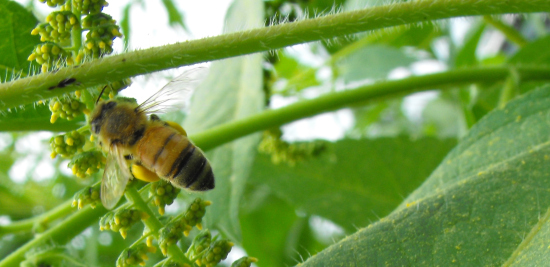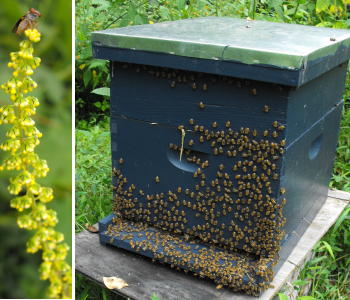
Honeybees and ragweed

A couple of weeks ago, my mom came to visit. As I took her on the
grand tour of the garden, she looked toward the back of the trailer
where tall annuals had grown up over the roof. "What are those
beautiful plants?" she asked in awe.
"That's ragweed," I answered, and hurried her on by, to a more
manicured area of the yard. The truth is that we have patches of
ragweed growing all around, wherever it's hard to mow. I'd been
meaning to pull them out...until yesterday when I noticed that they are
our honeybees' new favorite plant!
 All
of that pollen which makes ragweed the bane of allergy sufferers also
means that honeybees can load up on winter protein with ease. I
was first alerted to their activity when the bees' buzzing broke into
my weeding trance Wednesday morning. I stopped to watch as the
worker bees brushed their hind legs together, pushing pollen into the
bright yellow sacs at the base of their legs. I even noticed
other insects visiting the ragweed, like the little fly in the skinny
photo to the right.
All
of that pollen which makes ragweed the bane of allergy sufferers also
means that honeybees can load up on winter protein with ease. I
was first alerted to their activity when the bees' buzzing broke into
my weeding trance Wednesday morning. I stopped to watch as the
worker bees brushed their hind legs together, pushing pollen into the
bright yellow sacs at the base of their legs. I even noticed
other insects visiting the ragweed, like the little fly in the skinny
photo to the right.
The picture on the far right is an example of what our three strong
hives look like during sunny days when there's a good nectar
or pollen
flow. The first time I noticed this, I thought something was
wrong, but the truth is that it's merely a bee version of rush hour
congestion. I guess I'll have to leave some ragweed around after
this --- good thing neither Mark nor I has allergies!
Shame-faced plug: Check out the chicken
waterers which fund this blog.
Want more in-depth information? Browse through our books.
Or explore more posts by date or by subject.
About us: Anna Hess and Mark Hamilton spent over a decade living self-sufficiently in the mountains of Virginia before moving north to start over from scratch in the foothills of Ohio. They've experimented with permaculture, no-till gardening, trailersteading, home-based microbusinesses and much more, writing about their adventures in both blogs and books.
Want to be notified when new comments are posted on this page? Click on the RSS button after you add a comment to subscribe to the comment feed, or simply check the box beside "email replies to me" while writing your comment.

The bees gathering on the outside of the hive is not so much rush hour as it is 1 of 2 things: it's too hot in the hive - good idea to check degree of ventilation you are providing - or the other - is the house bees out cleaning the front of the hive -
pay attention to their movement - if they are busy at work - moving back and forth in a limited area they are cleaning -
if they are just hanging out - it's because it's too hot in the hive -